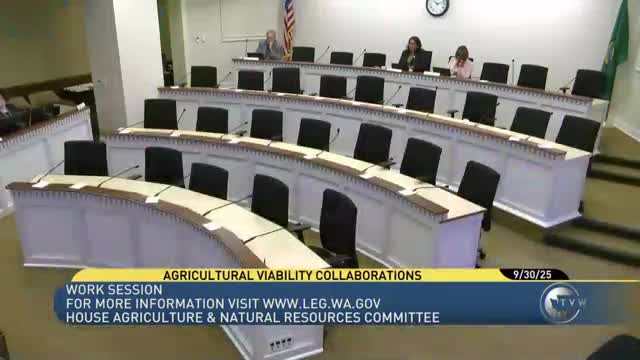WSU highlights precision agriculture, broadband and workforce as priorities to support state farms
September 30, 2025 | Legislative Sessions, Washington
This article was created by AI summarizing key points discussed. AI makes mistakes, so for full details and context, please refer to the video of the full meeting. Please report any errors so we can fix them. Report an error »

Raj Khosla, the newly appointed dean of the WSU College of Agricultural, Human and Natural Resource Sciences, told the House Agriculture & Natural Resources Committee that WSU’s tripartite land-grant mission — education, research and extension — underpins agricultural viability across the state and that the college will partner with state policymakers on workforce, research and outreach needs.
Khosla described the college’s statewide footprint and activities: degree programs at Pullman and multiple campuses, a network of research and extension centers (Mount Vernon, Puyallup, Prosser, Wenatchee and others), 40 extension locations across the state and a fiscal-year 2025 external funding portfolio that he said totaled “more than $114,000,000” in extramural funding for agricultural research. “We are a major land grant institution,” he said, and called education of the agriculture workforce a priority.
Khosla emphasized precision agriculture and “frugal innovation” as areas where WSU sees potential to offset labor pressures in labor-intensive crops. He said the college’s researchers are developing low-cost, printed, battery-less soil sensors that — if commercialized and mass-produced — could cost less than a dollar each and help growers make irrigation decisions during drought. He said broadband connectivity in rural areas is a constraining factor for scaling precision-ag tools and urged state support to close gaps so growers can use modern automation and data systems.
Khosla also described outreach programs: 4‑H youth development, the Master Gardener program and WSU Energy Program efforts to improve efficiency and bioenergy research, and said Connors awards about $1,000,000 in scholarships annually. He told the committee that extension is the university’s “front door” and that local, field-based research centers have been operating for decades.
He concluded by offering the college as a partner to the committee and the legislature on priorities for the state’s agricultural future.
Khosla described the college’s statewide footprint and activities: degree programs at Pullman and multiple campuses, a network of research and extension centers (Mount Vernon, Puyallup, Prosser, Wenatchee and others), 40 extension locations across the state and a fiscal-year 2025 external funding portfolio that he said totaled “more than $114,000,000” in extramural funding for agricultural research. “We are a major land grant institution,” he said, and called education of the agriculture workforce a priority.
Khosla emphasized precision agriculture and “frugal innovation” as areas where WSU sees potential to offset labor pressures in labor-intensive crops. He said the college’s researchers are developing low-cost, printed, battery-less soil sensors that — if commercialized and mass-produced — could cost less than a dollar each and help growers make irrigation decisions during drought. He said broadband connectivity in rural areas is a constraining factor for scaling precision-ag tools and urged state support to close gaps so growers can use modern automation and data systems.
Khosla also described outreach programs: 4‑H youth development, the Master Gardener program and WSU Energy Program efforts to improve efficiency and bioenergy research, and said Connors awards about $1,000,000 in scholarships annually. He told the committee that extension is the university’s “front door” and that local, field-based research centers have been operating for decades.
He concluded by offering the college as a partner to the committee and the legislature on priorities for the state’s agricultural future.
View full meeting
This article is based on a recent meeting—watch the full video and explore the complete transcript for deeper insights into the discussion.
View full meeting
